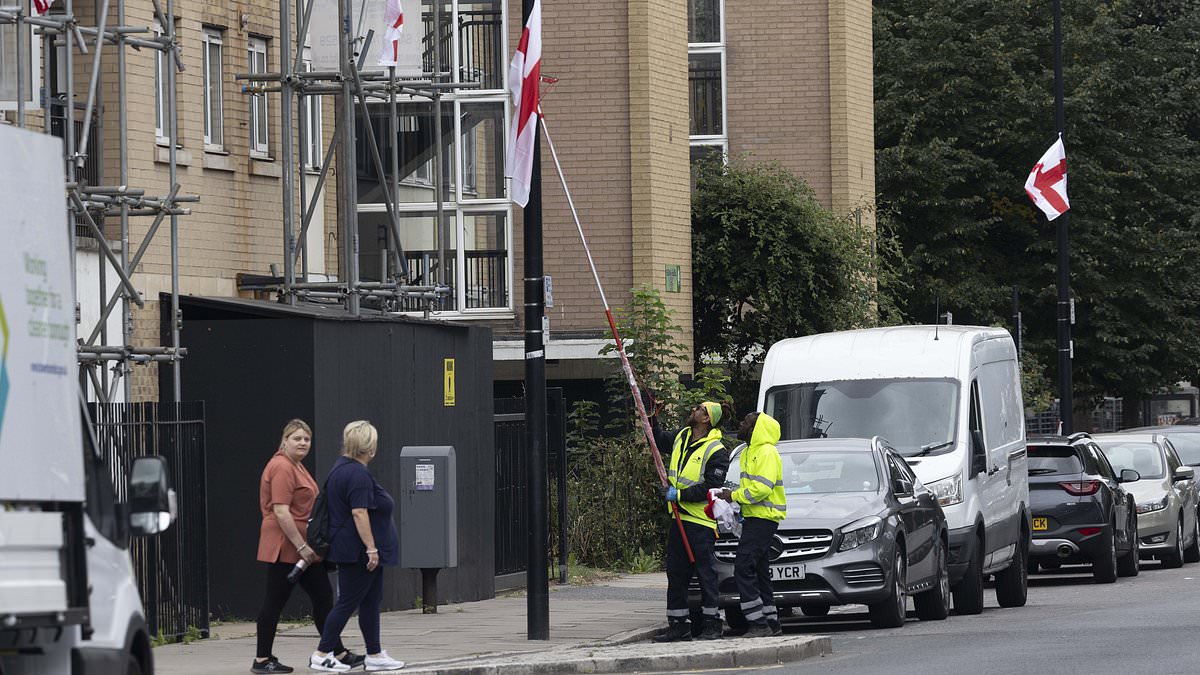
The debate over St George’s Cross flags continues to intensify as councils across Britain enforce policies regarding flag displays in public spaces. Recent events in East London’s Tower Hamlets have brought this issue into the spotlight, sparking widespread discourse among locals and officials alike.
Controversy in Tower Hamlets
In Tower Hamlets, council workers were observed removing St George’s Crosses that had been placed on public property by activists as part of a movement called ‘Operation Raise the Colours.’ This movement has gained traction in towns and cities such as Newcastle, Bradford, and Birmingham, with supporters aiming to counter flag bans by proudly displaying British symbols.
The removals have caused frustration among local communities, particularly due to perceived inconsistencies in policies. Tower Hamlets, for instance, had previously allowed Palestinian flags to remain displayed on council buildings and lampposts during past conflicts in Gaza, citing community cohesion. Tensions mounted when council officials, following orders from Mayor Lutfur Rahman, acted swiftly to remove England flags without providing the same leniency.
Public Reactions and Political Discourse
The backlash has drawn strong criticism from political figures, including former Conservative Party leader Sir Iain Duncan Smith, who argued that “British flags should be treated equally under council regulations.” Similarly, Susan Hall criticized Tower Hamlets for removing British flags while having allowed other political displays in the past.
Many residents, echoing these sentiments, voiced their dissatisfaction. Frustrated locals argued that the removal of national flags felt like an attack on their cultural pride and identity. Notably, concerns over the normalization of selective enforcement have heightened pre-existing tensions.
Birmingham’s Role in Flag Wars
The movement appears to have started in Birmingham, where activists flew hundreds of St George’s Crosses around certain neighborhoods. However, the council cited safety concerns and began removing these flags promptly, sparking further criticism for alleged double standards. An internal email leak later revealed that officials feared public backlash when acting against Palestinian flag displays in the area.
Government Flag Policies and Social Cohesion
According to the UK government, flags are a “symbol of national unity and pride” and councils are encouraged to adopt policies that balance local identities with national symbols. However, strict provisions around safety and regulations regarding where and when flags can be displayed have created ambiguities that some argue are being selectively enforced.
This growing debate underscores the challenges of maintaining social cohesion in diverse communities, where cultural pride and collective sensitivities often intersect.
Where National Pride Meets Lifestyle: Displaying Patriotism
As homeowners and communities seek to express their pride, decorative solutions can allow for private yet impactful displays of national flags. Consider using sustainable and locally-sourced flag poles, such as the EcoDisplay Flag Pole by Example Flag Company, which ensures stability and high visibility.
Whether for cultural celebrations, national events, or personal expression, striking a balance between celebration and respect for rules remains key.






